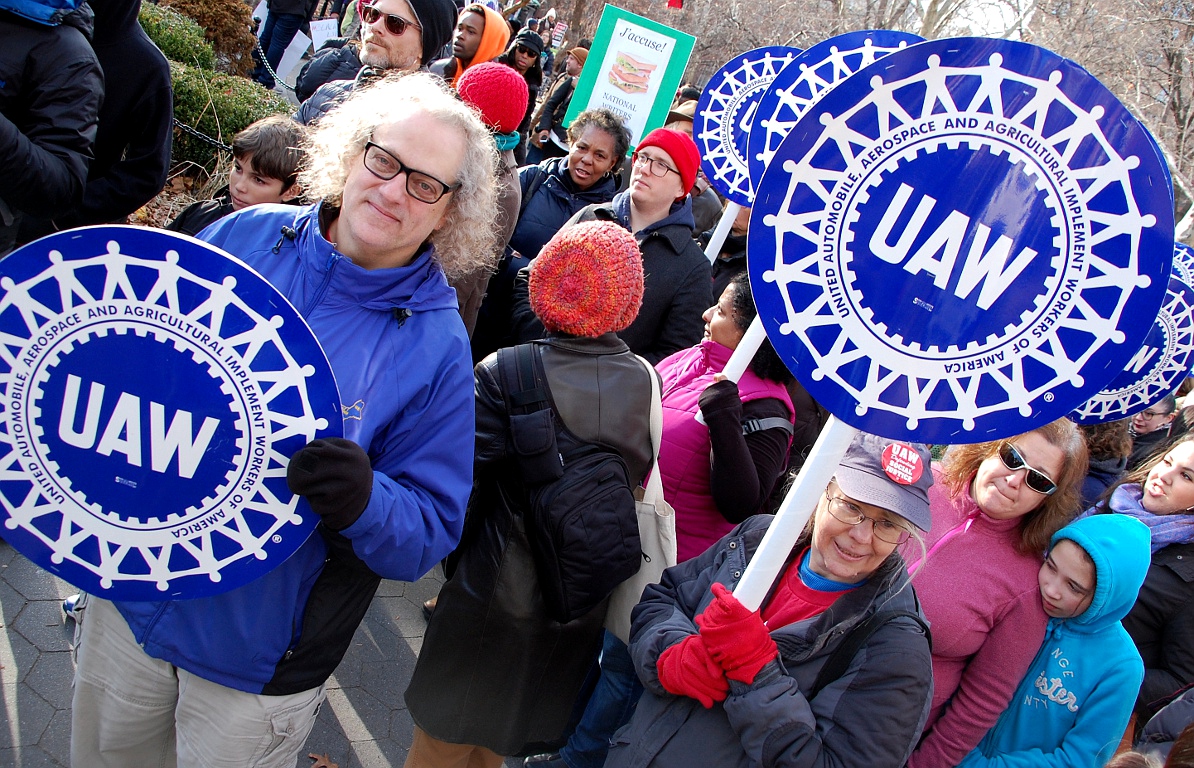
Nicholas Anway is a student at Harvard Law School.
In today’s news and commentary: United United Auto Workers held its first open election and results signaled opposition to established leadership; hundreds of thousands of middle-aged men have left the workforce since the pandemic; and New Jersey Senate advanced legislation that would codify a “Domestic Workers’ Bill of Rights” into state law.
United Auto Workers (“U.A.W.”) held its first open election last week, and the results signal a “wave of opposition to the established leadership,” according to the New York Times. After years of choosing its president and senior officials through delegate elections, U.A.W. held its first “one person, one vote” election, in which the union’s 400,000 active members and 600,000 retired members were eligible to vote. Over 100,000 ballots were cast. “In the race for president, incumbent Ray Curry defeated challenger Shawn Fain by 614 votes,” the AP reported on Sunday, citing unofficial results posted on a federal court-appointed monitor’s website. However, neither candidate won a majority of the five-candidate field, so Curry (who won 38.2% of the vote) and Fain (37.6) will head to a runoff election in January.
The shift to open elections was a concession by the union in settlement of a federal corruption investigation—“[a] dozen senior officials, including two former U.A.W. presidents, were convicted of embezzling more than $1 million in union funds for luxury travel and other lavish personal expenses,” according to the Times. “I think the members want to get this union back in line and see the election as their shot,” Mr. Fain said. He and other reform candidates “campaigned on taking a more confrontational stance in bargaining with Detroit’s three automakers,” arguing for “rescind[ing] concessions made to companies in previous contract talks, restoring cost-of-living pay raises and eliminating a two-tier wage and benefit system,” the AP reported.
Hundreds of thousands of middle-aged men have left the workforce since the pandemic, according to the New York Times. Despite strong labor markets, “[a]bout 89.7 percent of men ages 35 to 44 were working or looking for work as of November, down from 90.9 percent before the pandemic.” This decline in labor force participation is an anomaly: “employment rates have rebounded more fully for women of the same age and for both younger and older men.” And the decline is most precipitous among men without college degrees. Economists “attribute the trend to a cocktail of changing social norms around parenthood and marriage, shifting opportunities, and lingering scars of the 2008 to 2009 downturn—which cost many people in that age group jobs just as they were starting their careers.” Some economists further emphasized the effects of repeated labor market crises on middle-aged men: “They lost work early in their careers in 2008, faced a slow recovery after and found their jobs at risk again amid 2020 layoffs and an ongoing shift toward automation.”
The New Jersey Senate Labor Committee advanced legislation that would codify a “Domestic Workers’ Bill of Rights” into state law, according to WHYY. Designed to prevent wage theft and improve working conditions for domestic workers, the bill would require employers and domestic employees to enter into written contracts, provide privacy rights to domestic workers, and protect domestic workers from workplace discrimination. It would also create a state board with enforcement powers and establish penalties for non-compliance, including penalties for employer retaliation against domestic workers. The bill will move next to the New Jersey Senate Appropriations Committee of consideration. Similar legislation has passed in ten other states.






Daily News & Commentary
Start your day with our roundup of the latest labor developments. See all
July 11
Regional director orders election without Board quorum; 9th Circuit pauses injunction on Executive Order; Driverless car legislation in Massachusetts
July 10
Wisconsin Supreme Court holds UW Health nurses are not covered by Wisconsin’s Labor Peace Act; a district judge denies the request to stay an injunction pending appeal; the NFLPA appeals an arbitration decision.
July 9
In Today’s News and Commentary, the Supreme Court green-lights mass firings of federal workers, the Agricultural Secretary suggests Medicaid recipients can replace deported farm workers, and DHS ends Temporary Protected Status for Hondurans and Nicaraguans. In an 8-1 emergency docket decision released yesterday afternoon, the Supreme Court lifted an injunction by U.S. District Judge Susan […]
July 8
In today’s news and commentary, Apple wins at the Fifth Circuit against the NLRB, Florida enacts a noncompete-friendly law, and complications with the No Tax on Tips in the Big Beautiful Bill. Apple won an appeal overturning a National Labor Relations Board (NLRB) decision that the company violated labor law by coercively questioning an employee […]
July 7
LA economy deals with fallout from ICE raids; a new appeal challenges the NCAA antitrust settlement; and the EPA places dissenting employees on leave.
July 6
Municipal workers in Philadelphia continue to strike; Zohran Mamdani collects union endorsements; UFCW grocery workers in California and Colorado reach tentative agreements.